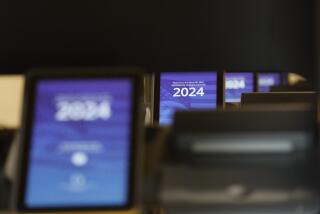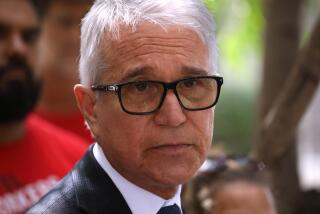Op-Ed: How to boost voter turnout in L.A. -- and it isn’t offering prizes
In a wondrous proposal that says more about the decline of civilization than its authors surely intended, the Los Angeles Ethics Commission has come up with a way to boost voter turnout in L.A. city elections: Make voters eligible for cash prizes. The recommendation may fail to persuade the City Council to enact such a plan, and even if it does, the particulars — two $25,000 awards? one $50,000 windfall? 500 all-you-can-eat coupons to In-N-Out Burger? — remain to be determined.
The plan’s purpose is to arrest the decline of voter participation in municipal elections, which has been falling for decades and hit an all-time low of 23% in last year’s mayoral run-off. Then again, it would be almost impossible to design a system more likely to produce low turnouts than L.A.’s elections. They are held in the spring of odd-numbered years, when potential voters are just coming up for air after the saturation coverage and ad blitzes of presidential and gubernatorial contests.
More fundamentally, by the terms of California’s Constitution, city officials don’t have all that much power over public affairs. Separately elected school boards run the schools, while county supervisors are in charge of health and welfare programs.
Yet L.A. voters once came to the polls in numbers far greater than they have recently, though city officials had no more power then and elections still were held in odd-numbered springs. The all-time turnout record (76%) — in raw numbers as well as percent — came in 1969, when incumbent Mayor Sam Yorty defeated challenger Tom Bradley. L.A. has a million more residents today than it did in 1969, but Bradley’s campaign inspired so many liberals and African Americans, while Yorty’s smear campaign (he linked his challenger, however implausibly, to the Black Panthers) scared so many centrist and conservative whites that more Angelenos voted than in any subsequent city election.
The 1969 contest featured all the elements that promote voter participation. The liberal Bradley and the law-and-order Yorty offered a clear choice on such vital matters as police practices (at the time, the Los Angeles Police Department comported itself much as the Ferguson, Mo., police do today). L.A.’s electorate was split ideologically. (In the 1968 presidential contest, L.A. County voters — we don’t have tallies for the city — backed Republican Richard Nixon over Democrat Hubert Humphrey by 48% to 46%.) The prospect of the African American Bradley becoming mayor produced record-high turnout in the city’s black community.
No such conditions pertain today. In 2012, an exit poll of city voters conducted by Loyola Marymount University showed Obama overwhelming Romney, 78% to 22%. Los Angeles’ political re-composition ensures that no mayoral candidate who stands outside the Democratic Party policy consensus — as Yorty once did — can wage a serious campaign.
Mayoral campaigns that hold the prospect of a breakthrough, however symbolic, for a minority group, such as those waged by Antonio Villaraigosa in 2001 and 2005, can still boost turnout within that group. But when a mayoral election neither poses a choice of governing philosophies nor promises an out-group breakthrough, voters won’t flock to the polls.
But even in ideologically uniform, local-TV-news-won’t-cover-politics, off-year-election L.A. there are still ways to make elections so consequential that Angelenos will vote.
In Oakland and San Francisco, the city councils have placed referendums on the ballot this fall to raise the local minimum wage and mandate paid sick days for workers. Such measures will surely boost turnout among working-class voters who often don’t vote in local elections.
Los Angeles is home to legions of such voters. By putting such referendums before voters in the next local election, the City Council and the mayor — who have been missing in action while other city governments up and down the state have been endeavoring to create more egalitarian and healthier civic economies — would go a long way to boosting turnout without turning city elections into a lottery.
Voters turn out for consequential elections. The only mystery in Los Angeles is why city officials haven’t done the work to make elections consequential.
Harold Meyerson is editor-at-large of the American Prospect and an op-ed columnist for the Washington Post.
Follow the Opinion section on Twitter @latimesopinion
More to Read
Start your day right
Sign up for Essential California for news, features and recommendations from the L.A. Times and beyond in your inbox six days a week.
You may occasionally receive promotional content from the Los Angeles Times.






